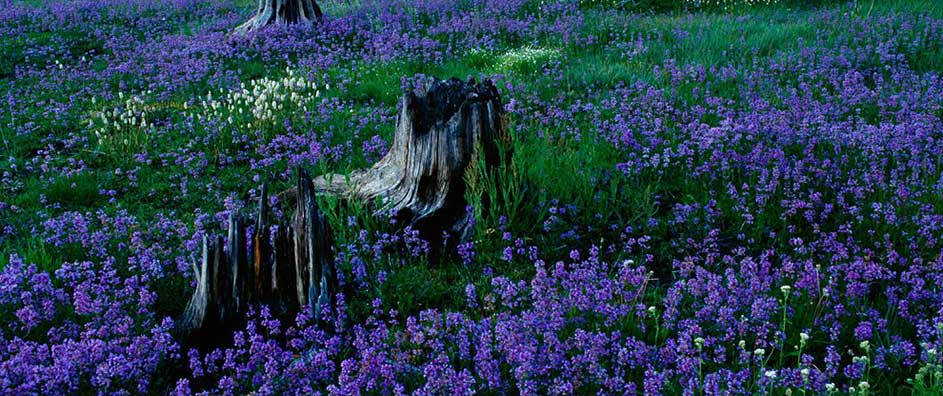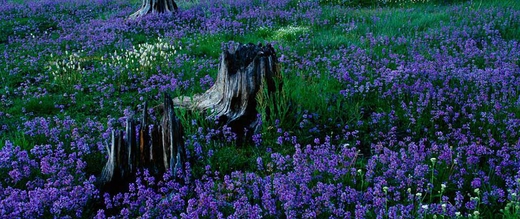The views expressed in our content reflect individual perspectives and do not represent the authoritative views of the Baha'i Faith.
 This is Part 1 of This Earth: A Garden of Paradise :
This is Part 1 of This Earth: A Garden of Paradise :
My wife and I and two good friends took a walk this past weekend through a stunning flower-filled mountainside in the Sierra foothills of Northern California. A spiritual community called Ananda has taken years to plant terraced gardens there, and you should see the result – a gorgeous, fragrant, light-filled paradise.
My wife Teresa said “Could heaven be more beautiful than this?”
Called the Crystal Hermitage (www.crystalhermitage.org), the gardens overlook a steep canyon carved over centuries by the Yuba River. Across the canyon you gaze into the deep green of a heavily-wooded mountainside, part of the Tahoe National Forest. Every year the Ananda gardeners lovingly plant about 13,000 Dutch tulip bulbs, in every color your imagination’s most beautiful garden will hold. Along with the blooming dogwood trees and the cherry blossoms, you walk through lush landscapes of daffodils, forsythia, peonies, snapdragons and all those tulips, with the heady scent of jasmine and lavender wisteria filling the air. Ahhh!
Maybe seeing exquisite gardens like this one made the poet T. S. Eliot say “April is the cruelest month.” The desperation of winter always blossoms into the desire of spring; the Northern Hemisphere wakes up and smells the roses; we see in this gorgeous month what paradise could look like; the flowers bloom in all their gaudy glory; and then they droop and fail and fall as the heat of summer builds. Perhaps the new life of spring, only with us for a short while, makes the other three seasons cruel because they make us wait.
April has always hosted humanity’s celebrations of spring, with its renewal, rebirth and regeneration. The Baha’is celebrate the birth of the Baha’i Faith for twelve days in late April and early May, in a time of rejoicing and gladness called Ridvan (pronounced rez-wan) – which means “paradise.” The Ridvan festival, which observes the period when Baha’u’llah first proclaimed the Baha’i teachings, initially took place in 1863 on the banks of the Tigris River in Baghdad, Iraq.
Exiled to Baghdad by the Persian government after his initial imprisonment in 1852, Baha’u’llah and his family and followers had just received the news of another exile, this time to Constantinople (now known as Istanbul). As they prepared to leave, to accommodate the large number of visitors, Baha’u’llah moved temporarily to a verdant island across the Tigris from Baghdad. The island held the beautiful, extensive Najibiyyih garden, named for Muhammad Najib Pasha, a former governor of Baghdad.
Baha’u’llah entered the garden, famous for its beauty, fragrance and singing nightingales, on April 22nd, 1863. (Baha’is in the West begin celebrating Ridvan on April 21st every year) He re-named the garden Paradise (Ridwan in Arabic and Ridvan in Persian), hosted hundreds of visitors, and announced to just a handful of those visitors that the Baha’i Faith had begun.
Baha’u’llah and the Baha’is celebrated the first Ridvan outside in that garden, joyously breathing in the fragrance of this new Faith. Roses bloomed. The Tigris river, flowing at its spring flood stage, gurgled around the island. Birds sang ceaselessly. The overwhelming beauty and grace of the natural world set the symbolic scene for the birth of the Baha’i Faith. That’s why, if you visit the Baha’i World Centre on Mt. Carmel in Haifa, Israel today, you’ll stroll through magnificent gardens.
In fact, in the West, this Baha’i Holy Day, quite appropriately, comes one day before Earth Day:
Consider how all created things eloquently testify to the revelation of that inner Light within them. Behold how within all things the portals of the Ridvan of God are opened, that seekers may attain the cities of understanding and wisdom, and enter the gardens of knowledge and power. Within every garden they will behold the mystic bride of inner meaning enshrined within the chambers of utterance in the utmost grace and fullest adornment. – Baha’u’llah, The Book of Certitude, p. 139.
“Within every garden,” Baha’u’llah writes, “they will behold the mystic bride of inner meaning…” Baha’u’llah’s writings, from even before the beginning of the revelation of the Baha’i teachings, center around the images and metaphors of the natural world:
O Brother! Not every sea hath pearls; not every branch will flower, nor will the nightingale sing thereon. Then, ere the nightingale of the mystic paradise repair to the garden of God, and the rays of the heavenly morning return to the Sun of Truth — make thou an effort, that haply in this dust heap of the mortal world thou mayest catch a fragrance from the everlasting garden… – Baha’u’llah, The Seven Valleys, p. 38.
So in celebration of the Baha’i festival of Ridvan, and to observe Earth Day and Earth Week, and just so we can all revel in the beauty and grandeur of the natural world, BahaiTeachings.org will host a twelve-day series of articles about the connection between nature and the human spirit, called This Earth: A Garden of Paradise.
Happy Ridvan, and we hope you’ll enjoy the series!


















Comments
Sign in or create an account
Continue with Facebookor